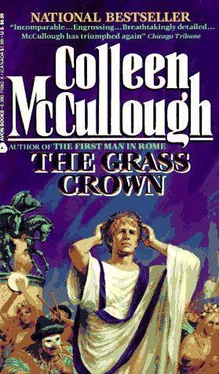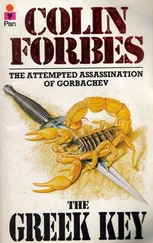But the look of horror on the face of some much-vaunted Greek sent by Athens or Alexandria to do a likeness of the most sculpted man since Scipio Africanus when he saw the Marian brows ! Each artist did what he could; yet even painted on a piece of board or linen, Gaius Marius's face ended up as mere background for his eyebrows. Whereas the best portrait of his old friend that Rutilius Rufus had ever seen had been a crude drawing in some black substance upon the outside wall of Rutilius Rufus's own house. Just a few lines was all a single voluptuous curve to suggest that full lower lip, a sort of glitter for the eyes how could whoever did it make black seem a glitter? and no more than ten lines for each eyebrow. Yet it was Gaius Marius to the life, with all the pride, the intelligence, the indomitability, the sheer character. Only how did one describe it, that form of art? Vultum in peius fingere ... A face fashioned out of malice. But so good that the malice had turned into truth. Alas, before Rutilius Rufus could work out how he might remove the piece of plaster without its crumbling into a thousand fragments, there had been a heavy fall of rain, and Gaius Marius's best likeness was no more. No backstreet scrawler upon walls could ever do that to Lucius Cornelius Sulla, however. Without the magic of color, Sulla could have been any of a thousand fairly handsome men. Regular face, regular features, a proper Romanness about him that Gaius Marius could never own. Yet seen in color, he was unique. At forty-two he showed no signs of thinning hair such hair! Neither red, nor gold. Thick, waving, worn perhaps a little too long. And eyes like the ice in a glacier, the palest of blues, ringed around with a blue as dark as a thundercloud. Tonight his thin, upcurving brows were a good brown, as were his long thick lashes. But Publius Rutilius Rufus had seen him in more urgent circumstances, and knew that tonight, as was his wont, he had applied stibium to them; for in reality, Sulla's brows and lashes were so fair they only showed at all because his skin was a pallid, almost unpigmented white. Women lost sanity, virtue, judgment over Sulla. They threw caution to the winds, outraged their husbands and fathers and brothers, gushed and giggled if he so much as glanced at them in passing. Such an able, intelligent man! A superlative soldier, an efficient administrator, brave as any man could hope to be, little short of perfection at organizing himself or others. And yet women were his downfall. Or so thought Publius Rutilius Rufus, whose nice but homely face and ordinary mousy coloring had never distinguished him from a myriad other men. Not that Sulla was a philanderer, or even an occasional ladykiller; as far as Rutilius Rufus knew, he behaved with admirable rectitude. But there was no doubt that a man who hungered to reach the top of the Roman political ladder stood a much better chance of doing so if he did not have a face like Apollo's; handsome men who were enormously attractive to women were generally mistrusted by their peers, dismissed as lightweights, or as effeminate fellows, or as potential cuckolders. Last year, thought Rutilius Rufus, his reminiscences meandering on, Sulla had run for election as a praetor. Everything seemed to be in his favor. His war record was splendid and well advertised, for Gaius Marius had made sure the electors knew how invaluable Sulla had been to him, as quaestor, tribune, and finally legate. Even Catulus Caesar (who had no real cause to love Sulla, the author of his embarrassment in Italian Gaul, when Sulla, by instigating a mutiny, had saved Catulus Caesar's army from annihilation) had come forth and praised his services in Italian Gaul, the year the German Cimbri had been defeated. Then, during the few short days when Lucius Appuleius Saturninus had threatened the State, it had been Sulla, tirelessly energetic and efficient, who had enabled Gaius Marius to put an end to the business. For when Gaius Marius had issued an order, it had been Sulla who implemented it. Quintus Caecilius Metellus Numidicus he whom Marius, Sulla and Rutilius Rufus called Piggle-wiggle had been assiduous before he went into exile in explaining to everyone he knew that in his opinion, the successful conclusion of the war in Africa against King Jugurtha was entirely due to Sulla, that Marius had claimed the credit unfairly. For it had been thanks to Sulla's solo efforts that Jugurtha himself had been captured, and everyone knew that until Jugurtha was captured, the war in Africa would drag on. When Catulus Caesar and some of the other ultra-conservative leaders in the Senate agreed with Piggle-wiggle that the credit for the Jugurthine War should by rights go to Sulla, Sulla's star seemed sure to rise, his election as one of the six praetors a certainty. To all of which had to be added Sulla's own conduct in the matter admirably modest, deprecating, fair-minded. Until the very end of the electoral campaign, he had insisted that his capture of Jugurtha must be attributed to Marius, as he himself had only been acting under Marius's orders. This kind of conduct the voters usually appreciated; loyalty to one's commander in the field or the Forum was highly prized. And yet, when the Centuriate electors assembled in the saepta on the Campus Martius and the Centuries one by one gave their choices, the name of Lucius Cornelius Sulla so aristocratic and acceptable in itself was not among the six successful candidates; to add insult to injury, some of the men who were elected were as mediocre in achievement as in their ability to show the proper ancestors. Why? Immediately after polling day, that was the question everyone attached to Sulla asked, though he said nothing. However, he knew why; a little later, Rutilius Rufus and Marius learned what Sulla already knew. The reason for his failure had a name, and was not physically very large. Caecilia Metella Dalmatica. Barely nineteen years old. And the wife of Marcus Aemilius Scaurus Princeps Senatus, he who had been consul in the year the Germans first appeared, censor in the year Metellus Numidicus Piggle-wiggle had gone off to Africa to fight Jugurtha, and Leader of the House since his consulship, now seventeen years in the past. It had been Scaurus's son who was contracted to marry Dalmatica, but he had killed himself after Catulus Caesar's retreat from Tridentum, a self-confessed coward. And Metellus Numidicus Piggle-wiggle, guardian of his seventeen-year-old niece, promptly gave her in marriage to Scaurus himself, though there were forty years between husband and wife. No one, of course, had asked Dalmatica how she felt about the union, and at first she hadn't been very sure herself. A little dazzled by the immense auctoritas and dignitas her new husband possessed, she was also glad to be free of her uncle Metellus Numidicus's stormy household, which at that time contained his sister, a woman whose sexual proclivities and hysterical behavior had made her a torment to live with. Dalmatica became pregnant at once (a fact which increased Scaurus's auctoritas and dignitas even more), and bore Scaurus a daughter. But in the meantime she had met Sulla at a dinner party given by her husband, and the attraction between them had been powerful, mutual, distressing. Aware of the danger she presented, Sulla had made no attempt to pursue an acquaintance with Scaurus's young wife. She, however, had different ideas. And after the shattered bodies of Saturninus and his friends were burned with all the honor their properly Roman status decreed, and Sulla began to go about the Forum and the city making himself known as part of his campaign to win a praetorship, Dalmatica too began to go about the Forum and the city. Wherever Sulla went, there too would be Dalmatica, all muffled in draperies, hiding behind a plinth or a column, sure that no one noticed her. Very quickly Sulla learned to avoid places like the Porticus Margaritaria, where indeed a woman of a noble house might be expected to haunt the jeweler's shops, and could claim innocent presence.
Читать дальше












